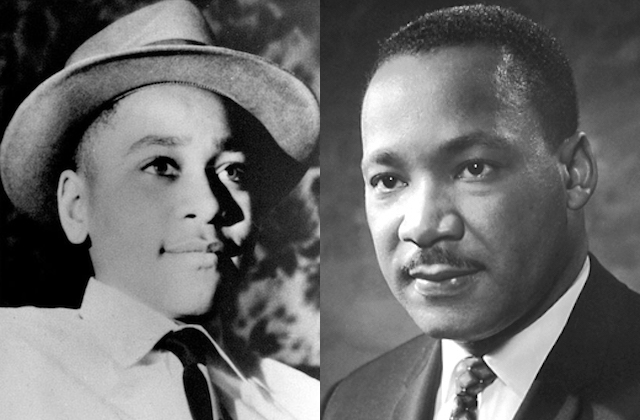Today (August 28) marks 52 years since Emmett Till was lynched for allegedly flirting with a White female store clerk—a charge that the then-clerk admitted was false in a book published earlier this year. His killing galvanized a wave of activism that manifest in the Civil Rights Movement. Eight years to the date after Till’s murder, during that movement’s height, Rev. Dr. Martin Luther King Jr. delivered his vision for an equitable United States that today’s activists still struggle to achieve.
For those not familiar with the specifics: J.W. Milam and Roy Bryant, who were White, kidnapped the 14-year-old Till, who was Black, from Till’s great uncle’s house in Money, Mississippi. Bryant’s wife, Carolyn, had accused Till, a Chicagoan visiting his family in Mississippi, of whistling at her while she worked at her family’s grocery store. It was an action punishable by death in much of the Jim Crow South. Bryant and Milam abducted Till before brutally beating him, shooting him in the head and throwing his body into the Tallahatchie River, where it was found three days later.
Till’s mother, Mamie Till, forced the country to confront the horror of lynching when she insisted on an open-casket funeral. Jet magazine and The Chicago Defender published images of Till’s body that spread around the world, provoking outrage and mobilization in Black communities. But the attention didn’t guarantee justice—both Milam and Bryant, despite overwhelming evidence, were acquitted by an all-White jury. Their subsequent legal protection allowed them to unabashedly confess to Till’s lynching in a 1956 Look magazine profile. Scholar Timothy B. Tyson published the "The Blood of Emmett Till" fifty years later, revealing to the world that Carolyn Bryant admitted to fabricating the details of her encounter with Till.
According to his Stanford University archives, Dr. King addressed Till’s murder when talking about "the evil of racial injustice" in subsequent years. He evoked "the crying voice of a little Emmett C. Till, screaming from the rushing waters in Mississippi" in a 1963 Mothers Day sermon.
Dr. King did not mention the eighth anniversary of Till’s death to the hundreds of thousands gathered before him at the March on Washington for Jobs and Freedom on August 28, 1963. Instead, his "I Have a Dream" speech spoke to the broader institutional discrimination—police violence, political and economic disenfranchisement and more—that allows for deadly racist terror to flourish:
We can never be satisfied as long as the Negro is the victim of the unspeakable horrors of police brutality. We can never be satisfied as long as our bodies, heavy with the fatigue of travel, cannot gain lodging in the motels of the highways and the hotels of the cities. We cannot be satisfied as long as the Negro’s basic mobility is from a smaller ghetto to a larger one. We can never be satisfied as long as our children are stripped of their adulthood and robbed of their dignity by signs stating, "For Whites Only." We cannot be satisfied as long as the Negro in Mississippi cannot vote and the Negro in New York believes he has nothing for which to vote.
[…]
I have a dream that one day on the red hills of Georgia, sons of former slaves and the sons of former slave-owners will be able to sit down together at the table of brotherhood. I have a dream that one day even the state of Mississippi, a state sweltering with the heat of injustice, sweltering with the heat of oppression, will be transformed into an oasis of freedom and justice.
Both Till and Dr. King’s legacies echo into the present day as Black America continues to resist racist oppression for a future that, despite the past’s stubborn persistence, realizes Dr. King’s dream.
Watch the "I Have a Dream" speech above and read a full transcript via the National Archives.
